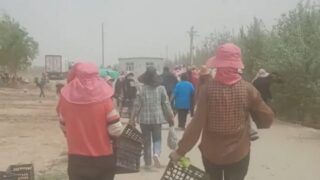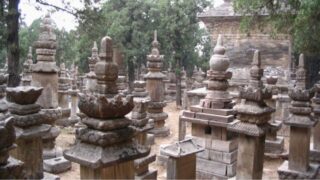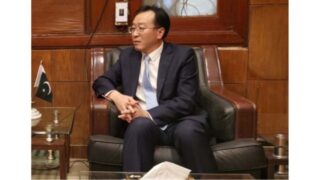Assimilation and Sinicization of the next generation of the Uyghurs are genocide at its worst.
by Gulfiye Y


“What is your biggest worry?” A six-minute video has attracted much attention from the Uyghur community. It shows how young Uyghur students lined up to respond in turn to a question: “What is your biggest worry?” To a casual viewer, there may be nothing improper in the clip, but to the Uyghurs to see and hear Uyghur children interrogated in this manner is worrisome and traumatic. These children have been “orphaned” and forcibly separated from their families, and are now isolated and under the total care, control and influence of Han Chinese “guardians” within orphanages and boarding schools for indoctrination, assimilation and sinicization.
The teacher; the loving, soft, caring, female voice with soft background music asks the question to Uyghur children, in Chinese, on what’s their biggest worry? The video was posted by camp survivor Zumrat Dawut. Among the responses the ones that struck me the most are revealing and disturbing:
- When will my father return?
- When will uncle return?
- I want to eat yogurt, Uyghur bread with Muhlise (a Uyghur girl name)!
- Are my grades good enough?
- Why does “brother” keep clinging to me?
- My exam mark for Chinese literature is not good enough!
- Many people scold me and beat me!
- When I grow up, I cannot get into university!
- Why does dad need to study? [euphemism for re-education camp]
- [boy has strained smile; doesn’t say anything]
- Why my dad died?
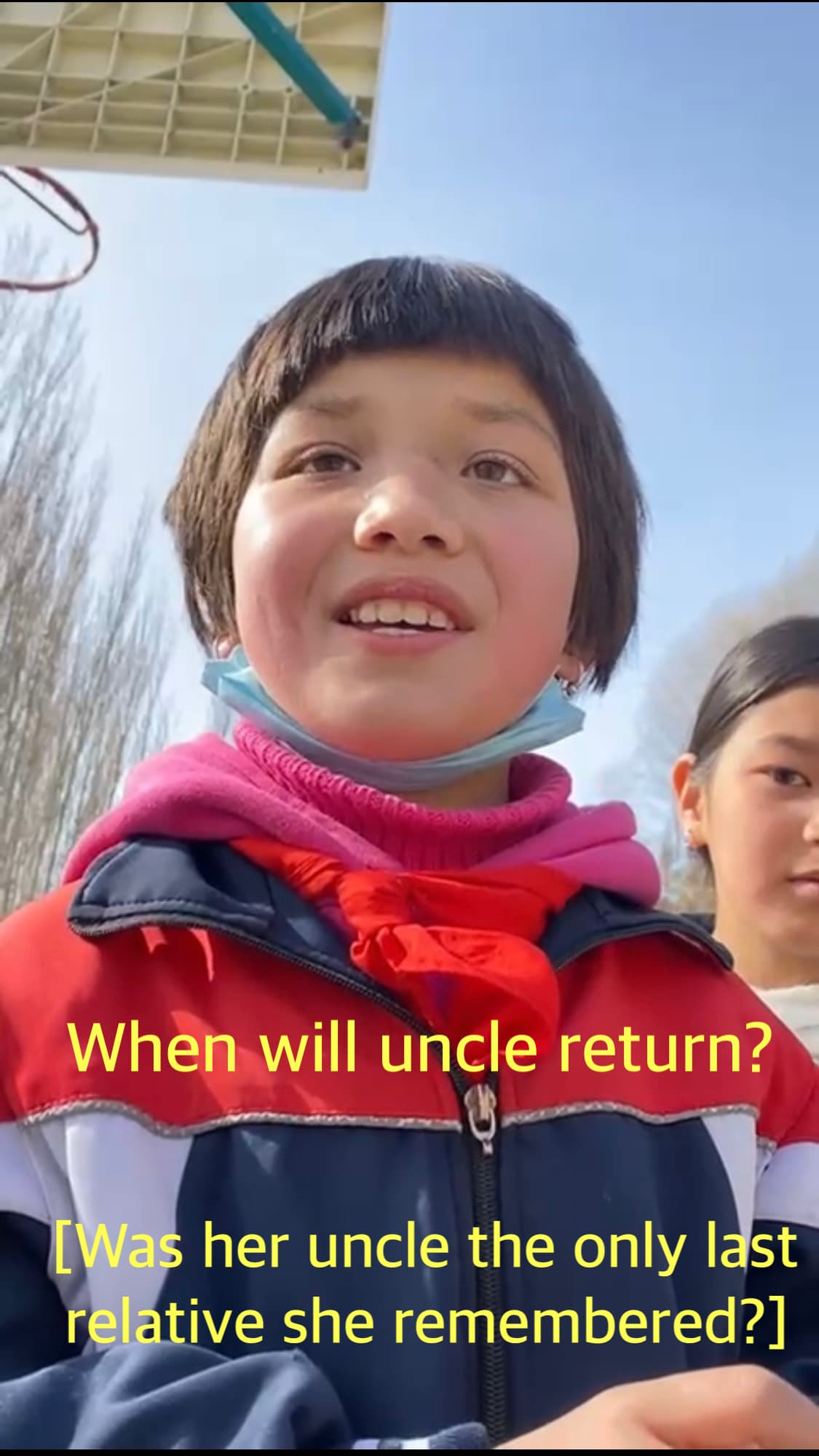

Others are non-committal such as “Why is the sky blue?” All are aware that they are being filmed, and it is disconcerting that their facial expressions do not match the nature of their “worry.”
In most cases, the teacher just acknowledges the response by repeating their worries but a few elicit her worldly wisdom:
“Does that mean that your ‘brother’ likes you very much?
Many people scold you and beat you? Why? Let’s solve this problem later, OK?
Um… are we studying in school, yes? Do we also have to work hard to live, yes? Yes, so our parents need to study, right? Right. Right, good! Study. If our study is good, study… hmmm… If our study is good, our life will get better and better, yes? Okay, let’s work hard together, shall we? You can be very happy when dad finishes his studies, right? Right, okay.
Why did your dad die? Um, you see, in this life, some people’s fathers go first, some people’s mothers go first, and some people will die when they are young or babies, right? Right. Although we don’t have a father, we do have our mother, right? Right. We are still very happy. We also study hard. Want to grow up happily, right? OK.”
Han are instructed to become “family” to Uyghurs—a fictitious relationship as a “brother” or “uncle” and so on. And the children are asked to speak Mandarin only. The reference that the child does have a “our mother” refers to China and the Communist Party, a doctrine that the students recite every day multiple times. By extension, there is no need for a “father” if the “mother” takes care of everything. So, when a girl in a boarding school expresses concern about a “brother” who keeps clinging to her, it would suggest that she may be referring to a male classmate or friend who is displaying clingy behavior towards her, making her uncomfortable, or more likely and worse, she may be experiencing unwanted attention from a male staff member, which is causing her distress.
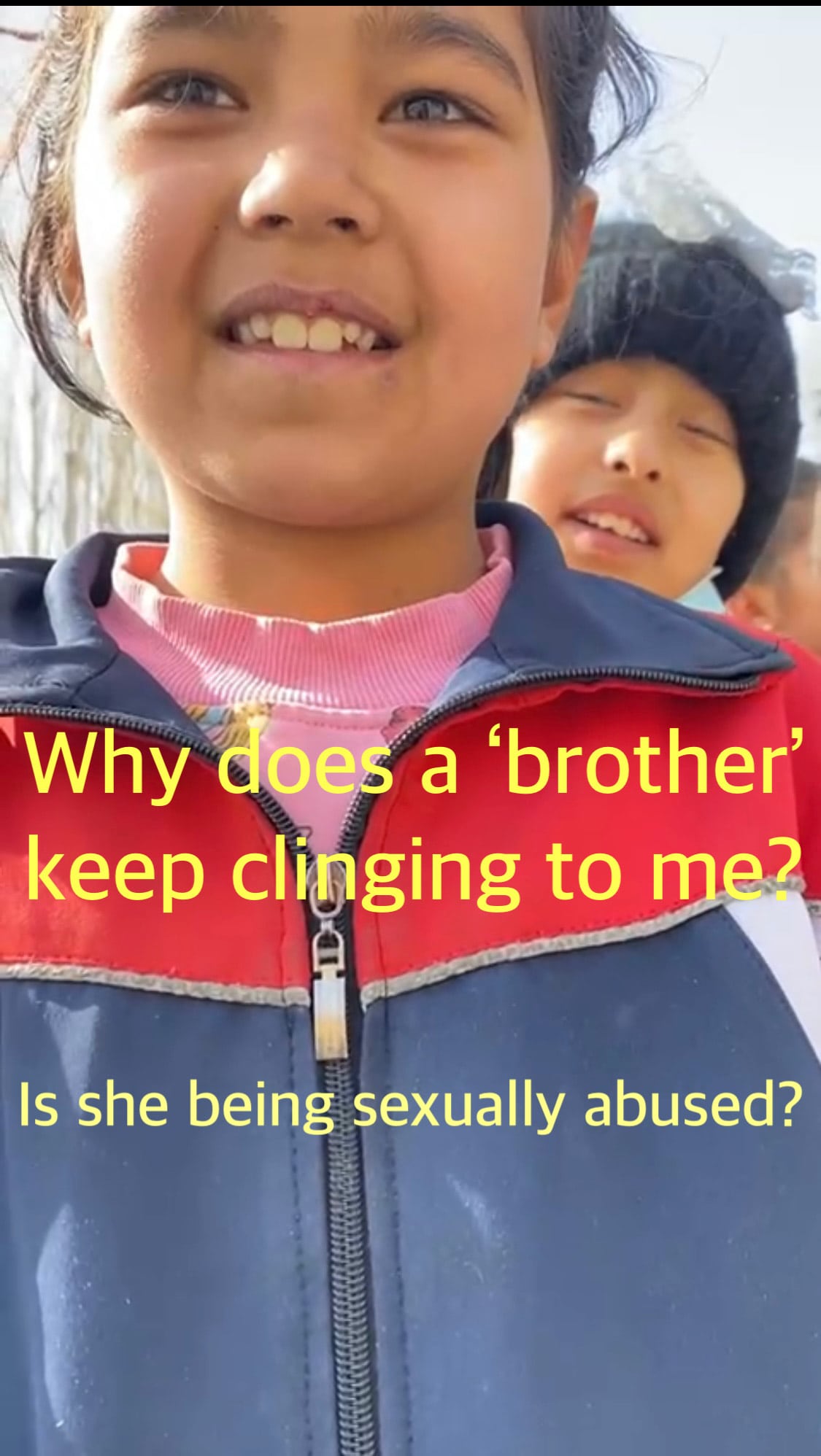

Another video (41”) comes from Shufu County Tashmilik Middle School, Kashgar:
“ [In Chinese, early in the morning, girls’ dorm]:
Chinese man: “Prove you are Chinese in one sentence.” [Translated]:
- Read books for the rise of China.
- When there is sacrifice, there is China.
- We keep in mind a phrase from Chairman Mao. Study hard and progress every day.
- If the New Year has a color, then it’s China Red.
- Taiwan is an inseparable part of China.
- I am proud; I am Chinese.
- Xinjiang is an inseparable part of China.
- Study hard and improve every day is our duty.
- Congratulations on being born in China, or rejoice yourself for being born and raised in China.
- The ancient East has a dragon, it is called China. In the ancient East there was a jumping dragon called China.”
The Uyghur parents are witnessing the indoctrination of their young by the CCP, which educates the next generation of Uyghurs in a way that eradicates their culture and remolds Uyghur children to the Han-Chinese way of life. It is the alienation of their children. A large percentage of the day is spent on the repetitive recitations of slogans, singing “patriotic” red songs, and self-criticism of faults and crimes they had “committed.”


These videos, and many others, are being scrutinized closely by Uyghurs who try to recognize their missing children. One such occurrence happened when a father, who lives in Istanbul, Abdurahman Tohti, 33, four years ago, quite by accident, happened to come across his missing, then 4-year-old, son on the social media Douyin (TikTok). The father immediately recognized his son, who in the video is being quizzed on propaganda points about the Chinese “motherland” in Mandarin. The father is in shock and can’t stop crying. This Uyghur man had lost all contact with family for seven-plus years and also just learned that six family members were each sentenced to 15 years in Chinese prison. The father still doesn’t know where his son and daughter are.


It would be a big mistake to assume that other orphanages and schools are exempt from the activity outside these venues. With the system of governance in China it is a given that the same indoctrination would be practiced in all schools.
The manual “Hundred Questions and Hundred Examples” for the “Becoming Family” and the Fanghuiju program wherein the Han inserted themselves into the personal and private lives of the Uyghur families may shed some light on the mindset of this “war on terror.” Two chapters are: “43, How to make grassroots propagandists an effective force for propaganda and education of the public?” and “53: How to influence the family through children?”
In a white paper published in July 2019 by China’s State Council Information Office, the government denied the Uyghurs’ Turkic ancestry, stating that “Islam is neither an indigenous nor the sole belief system of the Uyghurs” but was imposed by the expansion of the Arab Empire, and that “theocracy” and “religious supremacism” were a betrayal that needed to be opposed. It looks like rewriting history.
“Only when you, your children, and your grandchildren become Chinese” will the CCP be satisfied. “They said no one can change the document since it was sent from the Central Committee. They said that the current system would not change until all Muslim nationalities would be extinct.” “Break their lineage, break their roots, break their connections, and break their origins. Completely shovel up the roots of ‘two-faced people,’ dig them out, and vow to fight these two-faced people until the end,” wrote Maisumujiang Maimuer, a Chinese religious affairs official, on August 10, 2017, on a Xinhua Weibo page.
Since 2017, almost every ethnic minority deputy party secretary in Xinjiang has published at least one written pledge to “speak up and brandish the sword.” They swear to “ferret out the Party’s enemies”— “the two-faced people” who are “inferior to beasts,” to “root out” and “smash” the two-faced people and the “three evil forces;” to fight “bloody battles with them till death.”
The boarding schools and orphanages have been weaponized to accomplish just that.
Post 2013, the Chinese qualify their human rights statements with the qualifier “with Chinese Characteristics.”
Paragraph 4 of China’s 2018 National Report states under the section headed “Human rights with Chinese characteristics” that “there is no universal road for the development of human rights in the world.” China’s previous 2013 report declared “China respects the principle of universality of human rights.” Why the qualifier?
“Guided by Xi Jinping’s Thought on Socialism with Chinese Characteristics for a New Era, China attaches great importance to the promotion and protection of human rights, ever acting as an advocate, practitioner and promoter of the cause of protecting human rights and always following the road of developing human rights with Chinese characteristics,” the National Report says.
The UN Office of the High Commissioner for Human Rights (OHCHR) published an “Assessment of human rights concerns in the Xinjiang Uyghur Autonomous Region, People’s Republic of China” (August 31, 2022) after many non-responses from the Government of China.
“During its review of China’s periodic report in August 2018, the document says, the UN Committee on the Elimination of Racial Discrimination expressed alarm over numerous reports … under the pretext of countering religious extremism in XUAR. The assessment contained in this document is based on China’s obligations under international human rights law, contained principally in the human rights treaties to which China is a State Party …”


In response The Permanent Mission of the People’s Republic of China to the United Nations Office at Geneva issued a position response: “China firmly opposes the release of the so-called ‘assesment’ by the OHCHR. This so-called ‘assesment’ runs counter to the mandate of the OHCHR, and ignores the human rights achievements made together by people of all ethnic groups in Xinjiang and the devastating damage caused by terrorism and extremism to the human rights of people of all ethnic groups in Xinjiang. Based on the disinformation and lies fabricated by anti-China forces and out of presumption of guilt, the so-called ‘assesment’ distorts China’s laws and policies, want only smears and slanders China, and interferes in China’s internal affairs, which violates principles including dialogue and cooperation, and non-politicization in the field of human rights, and also undermines the credibility of the OHCHR… China implements an ethnic policy featuring equality, unity, regional ethnic autonomy, and common prosperity for all ethnic groups. All ethnic groups, including the Uyghur, are equal members of the Chinese nation. Xinjiang has taken actions to fight terrorism and extremism in accordance with the law, effectively curbing the frequent occurrences of terrorist activities. At present, Xinjiang enjoys social stability, economic development, cultural prosperity and religious harmony. People of all ethnic groups in Xinjiang are living a happy life in peace and contentment. It is the greatest human rights protection and the best human rights practice.”
“Out of purposes of refuting lies and clarifying truths,” China provided the OHCHR with a report entitled “Fight against Terrorism and Extremism in Xinjiang: Truth and Fact.” The report goes on to describe a fanciful utopia that goes counter to all available evidence referred to in the Assessment.
Of note is that the term “rule of law” is referred to in this “Truth and Fact” document over a dozen times, and the term “law” over 300 times. The law is an expression of the Party’s will. “We must never copy the models and practices of other countries and must not follow the path of Western ‘constitutionalism,’ ‘separation of powers,’ or ‘judicial independence,’” Xi Jinping said in a 2018 speech.
The terms “Chinese Characteristics,” “terrorism,” the “Rule of Law” and “according to law” are undefined and vague. As used here, the “law” legitimizes any action “according to the law” in the same sense as “I was just following orders.”
The children caught in the orphanage and boarding school environment are the most vulnerable to this “war on terror,” with little to no recourse to get out. They are there “according to the law” after having been made “orphans” or “abandoned,” or by mandatory schooling laws with the itinerary dictated by a government that is conducting a “war” against their culture, religion, and race. If anything, this is an effective method to prime Uyghur children for military service as evidenced by multiple videos posted on social media.



